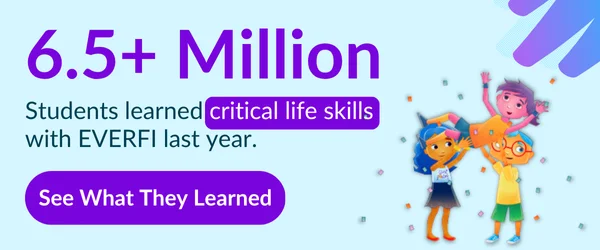- Blog
- Career-Connected Learning: Overview for District Leaders
Career-Connected Learning: Overview for District Leaders
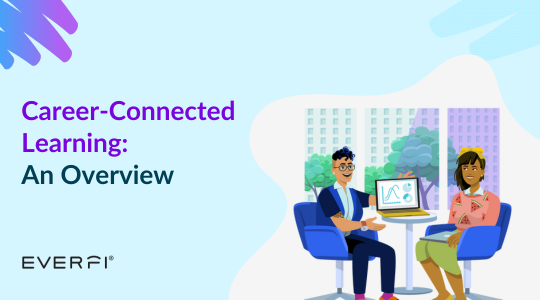
What if making sure your students landed their dream job was easier than you ever thought?
You hear it all the time: Students and teachers alike draw a distinction between how the classroom works and how the “real world” works. The classroom should ideally reflect the challenges students will face in their vocational careers and offer the skills they need to succeed. In turn, future career success will require utilizing the skills learned in the classroom in dynamic and creative ways.
Because of this, most school districts have focused on career-connected learning as a staple of K-12 education. However, the results are often mixed because everyone has a different idea of what CCL is and how it should work. Furthermore, administrators wear so many hats during their day that they can easily be overwhelmed by all that needs to be done to create a robust and impactful CCL program.
Worried that you might be one of them? This guide will help you learn everything you need to know about career-connected learning while providing free CCL resources you can integrate into your own school district immediately.
Table of Contents
- What is career-connected learning?
- Benefits of career-connected learning
- Challenges of implementing career connected learning
- Everfi’s free career-connected learning resources
What Is Career-Connected Learning?
Career-connected learning (CCL) has many names, including work-based learning and career pathways. Whatever the name, though, CCL is all about ensuring that a student’s education provides the skills they need to eventually succeed in a chosen career. Instead of making the distinction between academic and vocational skills, this approach ensures that a sufficient number of work-based learning experiences are integrated into a student’s education.
What are work-based learning experiences? Broadly speaking, WBL experiences are those intended to provide students with specific vocational skills. This may include internships, job shadowing, apprenticeships, or simply classroom activities designed to measure things like soft skills that come in handy in the workplace.
While there is no one-size-fits-all answer to how many WBLs a CCL program should have, it is advisable to develop a number suitable for your own district (for example, ensuring that students experience a minimum of 50 WBL hours before graduating).
Along with those work-based learning opportunities, CCL offers students the career and technical education (CTE) they need to discover their future profession and develop the skills required. This often requires collaborating with various industry partners, many of whom will be excited to help foster their next generation of prospective job applicants.
This approach is valuable for students because it provides them with the real-world skills and career pathways they need to succeed in a competitive job market that is constantly changing due to technology.
You might be surprised at how much more seriously students take their education when they realize it provides a clear path to their dream job.
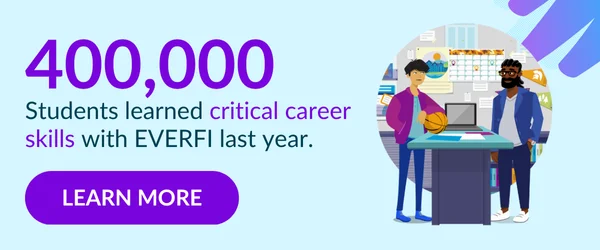
The Benefits of Career-Connected Learning
Some came into this article asking questions like “What is work-based learning?” but other administrators are veterans of integrating CCL into their districts. Those admins are most likely struggling with a different question: “How can I improve and expand my existing CCL program?”
To answer this question for yourself, it’s important to brush up on what the primary benefits of CCL really are. Making the most of each benefit requires a different approach to career-connected learning. By defining the benefits your district needs the most, you can better identify new innovations and approaches to help you reach your goals.
Enhanced Student Engagement and Motivation
One of the biggest difficulties teachers face is a lack of engagement and motivation among students. It doesn’t matter if an instructor has all the knowledge in the world if they cannot make students interested in learning. As for students, many of them tune out because they worry that lessons have no real bearing on what they will be doing once they graduate.
Fortunately, CCL engages students in part because it helps them realize their career goals.
- 59% of students expressed a desire for more CCL experiences;
- Almost 60% of New Hampshire students who completed internships or externships said that CCL informed their post-high school career planning.
- 52% of students that completed Everfi’s free STEM Career Exploration resource reported that it increased their interest in STEM careers.
By giving students what they want, you can better improve their engagement and overall motivation for learning.
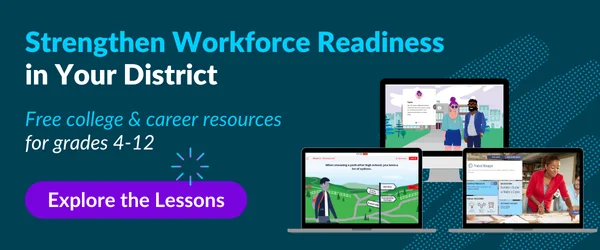
Development of Critical Skills for the Workforce
At the heart of CCL is the desire to work backward from a simple question: What skills will students need in the workforce, and how can those skills be taught in the classroom? The truth is that many students have difficulty realizing how to apply certain lessons to real-life situations, which is why there are so many memes lamenting that students aren’t taught to balance checkbooks when such balancing is nothing more than applied math.
With career-connected learning, special emphasis is placed on workplace-friendly skills that students will learn, including communication and teamwork. They will also learn how critical thinking can help them become adaptable problem-solvers. Those skills will be suitable for both college and career success, and students will naturally have more buy-in for lessons that directly impact their future earning potential.
Supporting Long-Term College and Career Readiness
When it comes to career-connected learning, the word that most people naturally focus on is “career.” However, you should know that proper CCL doesn’t focus entirely on workforce preparation. It also provides students with the preparation they need (including so-called “soft skills”) to succeed in college.
Just as CCL helps students identify their dream jobs and the skills needed to attain those jobs, it also helps them research college options and determine the skills needed to both stand out as applicants and later succeed as four-year students. This ultimately better prepares students to make the most informed decisions about what they plan to do after graduating high school.
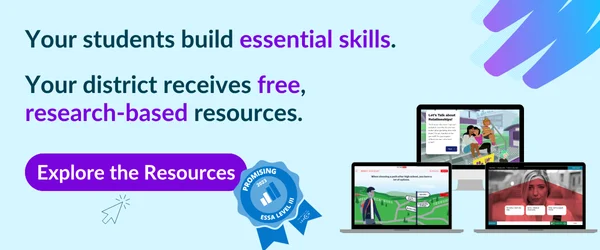
After completing Everfi’s free employability skills resource, Keys To Your Future,
- 81% of students agreed that the course helped them see how their interest and skills related to future careers
- 76% of students felt at least somewhat prepared to make a plan for their college and career goals
- 83% of students agree that the course helped them see what steps to take to reach their long-term goals
“We have found that using Everfi programs in our district has given us the opportunity to provide education in many critical areas. These comprehensive, evidence-based programs have allowed us to empower our students with vital information that will last well beyond their school years.” – District Administrator, FL
Bridging Opportunity Gaps
Career-connected learning plays a crucial role in bridging opportunity gaps for students by providing them with practical experiences and skills that align with industry needs. By integrating real-world work experiences into the educational curriculum, students gain exposure to various career paths and develop essential skills that are often not covered in traditional classroom settings.
Additionally, career-connected learning fosters partnerships between schools and local employers, creating a network of support that benefits both students and the community. These partnerships provide students with internships, apprenticeships, and other work-based learning opportunities that are critical for their career development.
By ensuring that all students, regardless of their background, have access to valuable career exploration and skill-building opportunities programs like FutureReadyNYC help to level the playing field, giving every student the chance to succeed and pursue their passions.
New York City Schools is a strong implementer of Everfi’s suite of free workforce readiness resources, using every single resource to teach critical life skills. Last school year, NYC students experienced average learning gains of 19-26% depending on the resource.
“Thank you for creating a free resource that is rigorous and engaging. [I] can’t wait to see where it takes my students!” – Shavon R., Teacher, NY
The Challenges of Implementing Career-Connected Learning in Schools
Are you interested in creating a more robust career-connected learning program in your own school district? In that case, you need to know what separates the most effective CCL programs from everything else. Below, we have a breakdown of the following actions that any good CCL implementation must follow:
- Designing a comprehensive curriculum: It’s important for you to incorporate work-based learning experiences and the practice of real-world skills into the curriculum. As such, you need to revise your curriculum to ensure that it proves a strong CCL foundation that perfectly balances vocational and college readiness.
- Building relationships with industry partners: Some of the best WBL experiences come from internships and learning labs offered by local businesses. Many of them would love to partner with your district because they get to provide training to students, some of whom are likely to become future workers.
- Incorporating technology into learning: It’s important for any comprehensive CCL curriculum to emphasize technology because understanding and using tech is such a major part of the modern workforce. Additionally, students must have technological training to make proper use of EdTech resources provided by Everfi.
- Training educators and administrators: Many educators and administrators will be unfamiliar with every aspect of your expanded CCL program. By offering them thorough training, you can ensure they offer the highest-quality career-connected learning opportunities for students.
!["Everfi was a big part of our [professional development]...We were able to get teachers comfortable with the content and with what they were doing." -Susan Bistrain, District Admin - Prince George’s County Public Schools, MD](/wp-content/uploads/2025/10/banner-quote-susan-bistrain.webp)
It can be hard to implement those steps properly, but you don’t have to do it alone. Everfi is here to help by providing your district with no-cost
- Digital and Offline Workforce Readiness resources: Aligned to your state’s standards, each of Everfi’s award-winning resources are turnkey providing teachers with immediate assessment scores, supplemental lessons, and 24/7 tech support.
- Access to Everfi’s network of industry partners: Comprised of hundreds of national and local partners such The MassMutual Foundation and UBS, Everfi’s partner network provides teachers and students with opportunities to take part in digital and in-person learning events as well as college scholarship contests.
- District-wide and individualized professional development: Tailored to meet your needs, Everfi provides districts and teachers with training and 24/7 support to supercharge your career-connected learning program.
Want to learn more about Everfi’s free resources and support? Schedule a 15-minute call with our District Support Team today!
Major Challenges to CCL Implementation
Teachers, administrators, and even students are quick to acknowledge the benefits of career-connected learning. However, enhancing your current CCL program may prove harder than you think due to a number of potential challenges. By knowing what these challenges are ahead of time, you can better help your district overcome them and offer a comprehensive CCL curriculum.
For example, there may be institutional and cultural resistance from teachers, students, and even parents who object to disrupting “the way we’ve always done things.” For example, older teachers may prefer to teach lessons the same way they have for the past decade and resist the changes required by CCL, including the strong focus on technology. You may face similar resistance from parents who negatively compare how students are taught now to their own education and question why the school district had to change things up so dramatically.
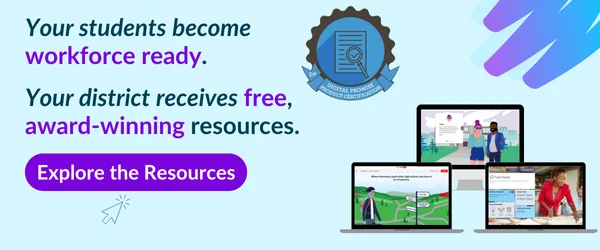
The best way to overcome this resistance is by holding a number of meetings and hands-on workshops where parents, teachers, and students can discuss CCL in a transparent way. This is the perfect opportunity for those who are resistant to these changes to learn more directly about the benefits of this approach and better understand how you will balance WBL experiences with traditional academic training.
And even after you get buy-in from enough people, it can be difficult to obtain funding and properly allocate resources to create an effective CCL environment. That’s one of the reasons that Everfi is happy to provide free resources and support for districts hoping to overhaul their own CCL regardless of budget restrictions they may be facing.
Once the program is implemented, you will need to develop key performance indicators to measure whether your students are achieving successful outcomes. For example, you can chart whether an enhanced CCL program helps reduce school absences, lifts grades, raises graduation rates, and so on. Regulation and monitoring will also be needed to ensure equity and access for the entire student body. All of this will be hard work, but thanks to Everfi, you don’t have to handle it by yourself.
Want to see how districts like New York City Schools are doing career-connected learning? Watch our district roundtable to hear from three districts on what’s working and how they are overcoming common challenges.
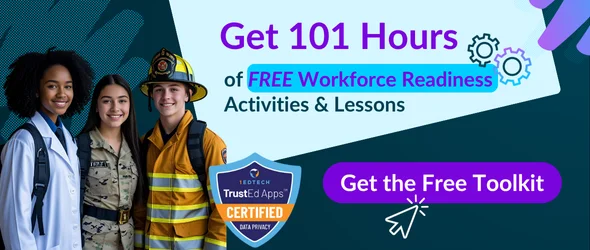
Everfi’s Career-Connected Learning Resources
When you’re ready to embrace career-connected learning, Everfi is here for you. When it comes to strengthening college and career readiness, we have a number of free, turnkey resources that can help. Each standards-aligned lesson engages students as they increase their knowledge and build critical skills on topics such as:
- Strengths and interest alignment
- Career exploration
- Goal setting and time management
- Financing higher education
- Data science, accounting, manufacturing, and more
With Everfi, you get free resources that help students with every aspect of CCL. All of these resources are already aligned with current academic standards, making them very easy to integrate into the existing curriculum. Resources are available to make CCL a vital part of all grade levels, which can help districts shape the next generation of career professionals from the ground up.
Taking the Next Step With Everfi
When you’re ready to meet with Everfi, we can set up a meeting with your local support team. During that call, Everfi will listen to your needs, share how we are supporting other districts in the area, and explain how we can support you at no cost. From there, your Everfi support team will work with you to create an implementation and support plan aligned to your goals and state standards.
Together with Everfi, your CCL program will give students skills that will open new doors for them long after graduation.
“Everfi provides some really good digital learning [resources] for our teachers and students [that are] interactive and engaging for the kids…it’s been a win-win for us all the way around.” – Dr. Larry Shifflett, Asst. Superintendent, Rockingham County Public Schools, VA
Free for All School Districts
Thanks to partners, we provide our digital platform, training, and support at no cost.
See why 3 out of 5 districts partner with Everfi.
Share 4 weeks of free resources with these teacher toolkits:

Chris Snellgrove is a college writing professor with over 15 years of experience as a teacher, professor, and instructor. He’s primarily taught at the high school and college levels but has also led ESL programs for primary school students.
